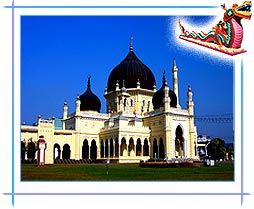Kedah is a site of great archaeological importance. In the Bujang Valley are the sprawling remains of a Hindu kingdom believed to date back to the 4th century A.D. The place is also known for its sun-drenched islands that comprise the legendary archipelago of Langkawi. No wonder that Kedah attracts hordes of tourists from all over the world.
History
Kedah is the site of the oldest civilization of Peninsular Malaysia. The Bujang Valley has remains of a Hindu-Buddhist kingdom that dates back to the 4th century AD. In the 7th and 8th centuries, Kedah was under the
 domination of Srivijaya, and was later under Thailand, until
the rise of the Malay sultanate of Malacca in the 15th century. The
establishment of Islam in Kedah is due to Malacca's influence.
domination of Srivijaya, and was later under Thailand, until
the rise of the Malay sultanate of Malacca in the 15th century. The
establishment of Islam in Kedah is due to Malacca's influence. In the 17th century, Kedah was attacked by the Portuguese after their conquest of Melaka, and by Aceh. By the end of the 18th century the Thailand threat arose once more. Fearing renewed domination by its northern neighbors, Kedah appealed to the British for assistance. As inducements to a commitment, Kedah ceded first Penang (1796) and then the adjoining strip of coastal land (1800) to the British. Nonetheless, Kedah fell to the Thais in 1821. Thailand transferred their sovereignty to the British in 1909. With the exception of the period of occupation by the Japanese during World War II, Kedah remained under British influence until independence. Kedah was a reluctant addition to the Federation of Malayasiain 1948.
Climate
Kedah has tropical Monsoon Climate, with temperature varying between 21°C and 32°C. It is generally dry and warm from January to March, and wet from April to December. Humidity is high throughout the year. Annual rainfall varies from 2,032 mm to 2540 mm.
Best Time to Visit
January to March is the best time to go to Kedah, as it is relatively dry during this period. You can also go in August or September at the time of Lumut festival.
Tourist Attractions / Places to See
Alor Setar: The capital of Kedah has many modern structures and shopping complexes of historical significance. Its long association with Thailand is evident in the Thai temples around the city. Nonetheless, it is still very much a Malay city with fewer Chinese and Indians than other west coast cities.
Bujang Valley (Lembah Bujang): The Bujang Valley is a sprawling historical site located in the foothills of Gunung Jerai. It is the richest archaeological area in Malaysia. Archaeological research indicates that an ancient Hindu-Buddhist kingdom ruled here as early as 300 AD. More than 50 ancient tomb temples, called candi, have been unearthed here.
Gunung Jerai: Gunung Jerai (1,200 meters) is the highest spot in the northern region of Peninsular Malaysia. The peak of Gunung Jerai offers breathtaking views and can be reached via the nature trail or by road.
Balai Nobat (Hall of Drums): Balai Nobat belongs to the old Sultanate of Kedah. The Hall features the nobat, the instruments of the royal orchestra. It comprises drums, gongs and a traditional flute. These instruments are played on special ceremonial occasions only. The musical skills of the nobat are generally passed on from father to son.
Langkawi: The Langkawi archipelago is made up of a cluster of 99 islands, sprinkled just off the shores of the Northern Kedah State in Peninsular Malaysia. During low tide, the number of islands expands to 104. Langkawi island is the largest of them all and is a very popular tourist resort. … (More).
Balai Besar: Situated near Balai Nobat, Balai Besar is an impressive wooden pavilion, built in 1898, which embodies certain aspects of Thai architecture. This 'great hall' is used frequently for royal and state functions.
Masjid Zahir: Officially opened in 1912, this mosque is an architectural landmark. With black domes set off against slender minarets, the Masjid Zahir is one of the most elegant and aesthetically pleasing mosques in Malaysia.
Pantai Merdeka: Located 60 km south of Alor Setar, this 1 km beach is a popular day spot for bathing and also offers both diving and sport fishing off its coast.
Shopping
The duty free island of Langkawi is a major shopping attraction in Kedah. "Pekan Rabu"-literally meaning Wednesday Market- located in the middle of Alor Setar is well-known among the local population and tourists. Most tourists visiting Alor Setar make it a point to shop around at the Pekan Rabu Complex.
How to Reach Kedah
Kedah can be reached by road, rail and sea. The North-South Expressway transverse the State of Kedah, thus enabling just a 5-hour ride from Kuala Lumpur to Alor Setar. Similarly the national railroad track also passes through the state with various stops along the way.
Malaysia Airlines, the national carrier flies several times a day from Kuala Lumpur to Alor Setar and Langkawi. There's also weekly direct flight from Osaka, Japan to Langkawi.
High-speed ferries operate from Kuala Kedah to Langkawi throughout the day. There are also regular ferry services from Penang as well as Saturn, Southern Thailand.



